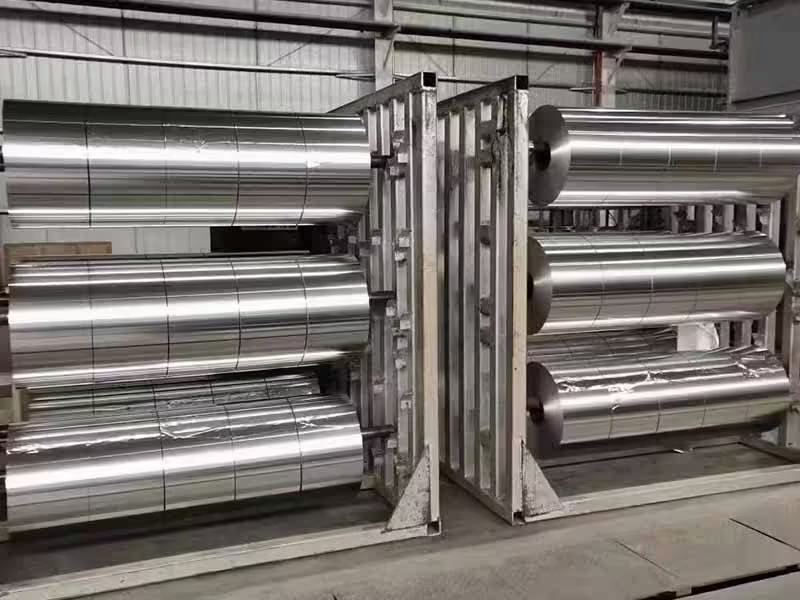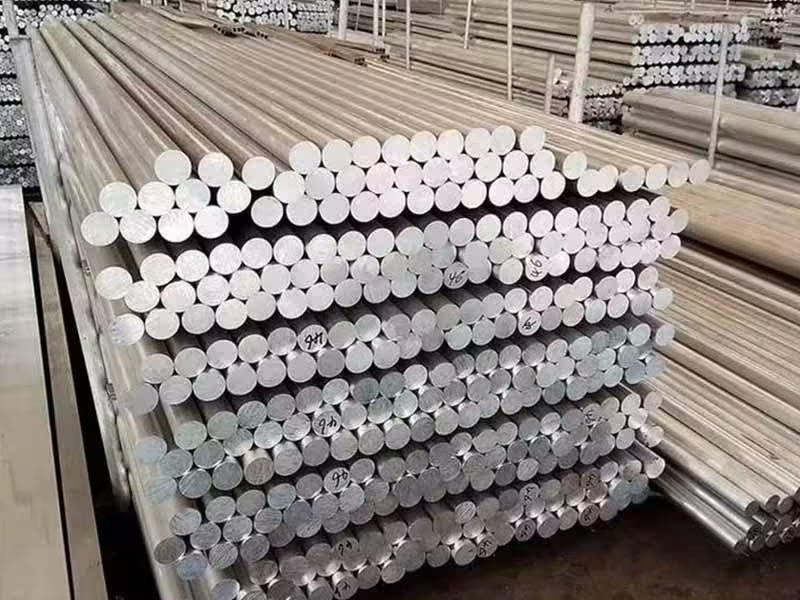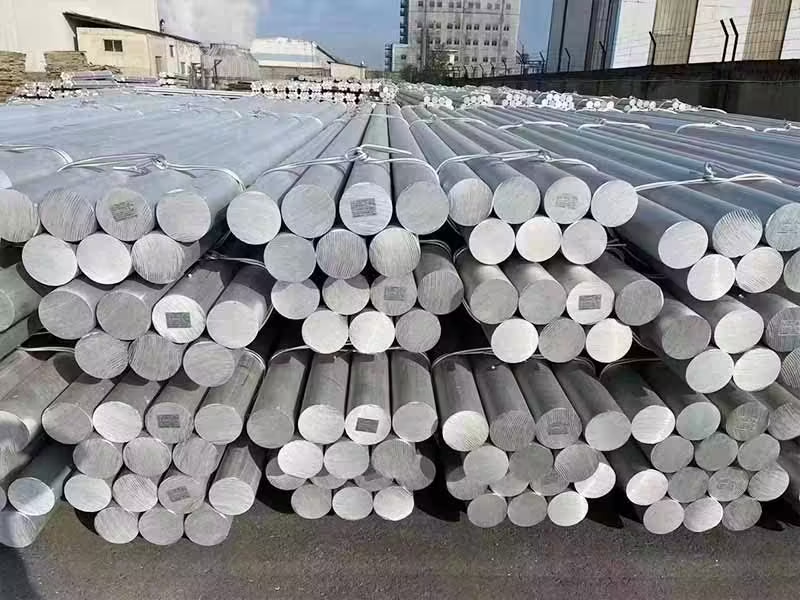내 블로그에 오신 것을 환영합니다!
본론으로 들어가기 전에, 제가 더 많은 정보를 공유하고, 커뮤니티와 소통하고, 업데이트를 게시하는 소셜 미디어 플랫폼에 함께해 주세요. 저와 소통하는 방법은 다음과 같습니다.
페이스북:https://www.facebook.com/profile.php?id=61571539990739
자, 이제 함께 여정을 시작해 볼까요? 여기 있는 내용이 통찰력 있고, 흥미롭고, 가치 있다고 느끼시기를 바랍니다.
목차
소개
모든 구성 요소가 원활하게 작동하여 시간, 에너지, 자원을 절약하는 분주한 공장이나 세련된 고층 빌딩을 상상해 보세요. 알루미늄 가공 제품(압출, 시트, 주물 등 맞춤 제작 부품)은 이러한 효율성의 핵심 요소로, 가볍고 견고하며 다양한 산업 분야에 활용될 수 있습니다. 자동차 패널부터 항공우주 프레임까지, 이러한 제품은 운영을 간소화하고 비용을 절감합니다.
이 가이드에서는 알루미늄으로 제작된 제품이 어떻게 효율성을 높이는지 살펴보고, 엔지니어, 제조업체, 설계자를 위한 이점, 응용 분야, 선택 팁을 설명합니다.
이해 알루미늄 가공 제품

알루미늄 가공 제품이란?
알루미늄 가공 제품은 압출, 주조, 단조 또는 판금 성형 등의 공정을 통해 알루미늄 합금을 특정 용도에 맞춰 제작한 부품입니다. 마치 스위스 군용 칼처럼 다재다능하고 내구성이 뛰어나며 정밀합니다. 주요 특징은 다음과 같습니다.
- 재료: ASTM B221 표준에 따라 높은 강도 대 중량 비율을 지닌 알루미늄 합금(예: 6061, 7075).
- 프로세스: 프로필, 브라켓 또는 패널과 같은 부품을 만들기 위해 절단, 용접, 굽힘 또는 CNC 가공을 합니다.
- 속성: 가볍고(강철 밀도의 1/3), 내식성이 뛰어나며 재활용이 가능합니다.
- 응용 프로그램: 건설, 자동차, 항공우주, 전자 분야에서 구조적 또는 기능적 역할을 위해 사용됩니다.
자동차 제조에서 섀시 부품과 같은 알루미늄 가공 제품은 차량 무게를 줄여 연비를 5~7% 향상시킵니다. 이러한 알루미늄 제품의 역할을 이해하는 것은 연비 향상 효과를 극대화하는 데 필수적입니다.
알루미늄 가공 제품이 효율성을 향상시키는 이유
알루미늄 가공 제품은 능률적인 워크플로우처럼 성능을 최적화하고 자원 사용량을 줄여 효율성을 높입니다. 다음과 같은 장점이 있습니다.
- 엔지니어를 위한: 가벼운 부품으로 설계와 조립이 간소화되어 생산 시간이 10~15% 단축됩니다.
- 제조업체용: 부식 방지 알루미늄 합금은 금속 제작에 드는 유지관리 비용을 줄여줍니다.
- 디자이너를 위한: 사용자 정의 프로필을 통해 혁신적이고 공간을 절약하는 솔루션이 가능합니다.
- 지속 가능성을 위해: 산업 벤치마크에 따르면 100% 재활용성은 환경 영향을 낮춥니다.
건설 분야에서 커튼월 시스템과 같은 알루미늄 제품은 설치 속도를 높여 프로젝트 일정을 개선하고 인건비를 절감합니다.
알루미늄 가공 제품의 유형
알루미늄 가공 제품은 다양한 형태로 제공되며, 각각 특정 요구 사항에 맞춰 제작됩니다. 유형을 알면 적합한 솔루션을 선택하는 데 도움이 됩니다.
- 압출: 구조 프레임을 위한 형상화된 프로필(예: 보, 튜브)로 건설에 이상적입니다.
- 시트/플레이트 제품: 클래딩이나 인클로저용 평판 패널. 자동차와 전자제품에 흔히 사용됩니다.
- 주조물: 엔진 구성 요소와 같은 성형 부품. 항공우주 및 기계에 사용됩니다.
- 단조품: 기어와 같은 고강도 부품으로, 고강도 작업에 적합합니다.
- 가공 부품: CNC를 통한 정밀 부품(예: 브라켓)은 로봇 공학에 필수적입니다.
항공우주 산업에서 주조 알루미늄 제품은 항공기 무게를 줄여 연료 효율성을 높이는 데 도움이 되며, 압출 성형 제품은 건물 외벽에 널리 사용됩니다.
활용의 핵심 요소 알루미늄 가공 제품 효율성을 위해
알루미늄 가공 제품의 재료 특성
알루미늄 가공 제품의 효율성은 정장에 적합한 원단을 선택하는 것과 같은 특성에서 비롯됩니다. 주요 특징은 다음과 같습니다.
- 강도 대 중량 비율: 6061 합금은 ASTM B209에 따라 2.7 g/cm³ 밀도에서 40 ksi 항복 강도를 제공합니다.
- 부식 저항성: 천연산화막이 녹을 방지하여 수명을 20-30%만큼 연장합니다.
- 열전도도: 150–200 W/m·K, 전자제품의 방열판에 이상적입니다.
- 성형성: 압출이나 단조를 통해 복잡한 형상으로 쉽게 제작할 수 있습니다.
- 재활용성: 95% 재활용 대비 1차 생산에서 에너지 절감 효과.
자동차 분야에서 알루미늄으로 제작된 제품의 가벼운 특성 덕분에 차량 무게가 10-20%까지 줄어들어 주행 거리와 배출량이 향상됩니다.
알루미늄 가공 제품으로 효율성을 높이는 응용 분야
알루미늄 가공 제품은 특정 작업에 맞춰 제작된 공구 등 다양한 산업 분야에서 탁월한 성능을 발휘합니다. 주요 응용 분야는 다음과 같습니다.
- 건설: 압출 보와 클래딩은 구조적 무게를 줄여 15%만큼 설치 속도를 높입니다.
- 자동차: 시트 패널과 단조 부품은 연료 소비를 5–8%만큼 낮춥니다.
- 항공우주: 10%는 주조물과 가공된 부품을 사용하여 연료 효율성을 높입니다.
- 전자제품: 방열판과 인클로저는 장치의 성능과 수명을 향상시킵니다.
- 기계: 정밀 부품은 로봇 시스템의 에너지 사용을 7–10%만큼 줄입니다.
제조 과정에서 CNC 가공 브라켓과 같은 알루미늄 가공 제품은 조립을 간소화하여 생산 시간을 단축합니다.
알루미늄 가공 제품의 제조 공정
알루미늄 가공 제품의 효율성은 정밀 공구를 제작하는 것처럼 제작 방식에 따라 달라집니다. 일반적인 공정은 다음과 같습니다.
- 압출: 알루미늄을 다이를 통해 밀어 넣어 프로파일을 만듭니다. 구조용 프레임에 이상적입니다.
- 주조: 용융 알루미늄을 금형에 붓습니다. 복잡한 모양에 적합합니다.
- 단조: 알루미늄을 압축하여 고강도 부품을 만듭니다. 기어에 사용됩니다.
- 시트 성형: 패널용 시트를 구부리거나 자릅니다. 클래딩에 흔히 사용됩니다.
- CNC 가공: 정밀하게 부품을 형성합니다. 로봇공학에 필수적입니다.
건설 분야에서 압출 알루미늄으로 제작된 제품은 커튼월의 빠른 조립을 가능하게 하여 프로젝트 효율성을 높여줍니다.
알루미늄 가공 제품 비교표
알루미늄 가공 제품이 효율성을 어떻게 향상시키는지 보여주기 위해, 이 표는 압출, 판재/강판 제품, 주조, 단조 및 가공 부품을 강도, 무게, 용도 및 제조 복잡성을 기준으로 비교합니다. 제조업체와 엔지니어를 위해 설계된 이 표는 가격 정보를 생략하고 기술적 특성에 초점을 맞춰 산업 전반에 걸쳐 최적의 성능을 제공하는 알루미늄 가공 제품을 선택하는 데 도움을 줍니다.
| 제품 유형 | 강도(ksi) | 무게(g/cm³) | 주요 응용 분야 | 제조 복잡성 | 효율성 혜택 |
|---|---|---|---|---|---|
| 압출 | 35–45(예: 6061 합금) | 2.7 | 구조 프레임, 커튼월 | 낮음; 간단한 다이 성형 | 15% 건설 현장 설치 속도 향상 |
| 시트/플레이트 | 30~40세 | 2.7 | 클래딩, 차량 패널 | 중간; 절단 및 굽힘 | 자동차 연료 절감 5–8% |
| 주조물 | 25–35 | 2.7 | 엔진 부품, 항공우주 부품 | 높음; 금형 설계 필요 | 10% 항공우주 중량 감소 |
| 단조품 | 50–70(예: 7075 합금) | 2.7 | 기어, 중장비 | 높은 정밀 단조 | 20% 기계의 수명 연장 |
| 가공 부품 | 35–50 | 2.7 | 브라켓, 로봇 구성 요소 | 높은 CNC 정밀도 | 7–10% 제조 시 조립 속도가 더 빠름 |
이 표는 알루미늄 가공 제품이 효율성에 필수적인 이유를 보여줍니다. 압출은 제작 속도를 높이고 단조는 기계 내구성을 향상시킵니다. 알루미늄 합금과 공정을 비교하여 생산성을 극대화하는 제품을 선택할 수 있습니다.
알루미늄 가공 제품 사용을 위한 실용적인 팁

프로젝트에 맞는 알루미늄 가공 제품 선택
알루미늄 가공 제품을 선택하려면 레시피에 들어갈 재료를 고르는 것처럼 계획이 필요합니다. 단계는 다음과 같습니다.
- 요구 사항 정의: 귀하의 적용 분야에 필요한 강도, 무게, 부식 방지 요구 사항을 지정하세요.
- 합금을 선택하세요: 프로젝트 요구 사항에 따라 다양성을 원하면 6061을 선택하고, 강도가 높은 경우 7075를 선택하세요.
- 프로세스 평가: 프레임에는 압출 방식을, 복잡한 모양에는 주조 방식을 선택하세요.
- 표준 확인: 부품이 금속 제작 품질에 대한 허용 오차를 충족하는지 확인하세요.
자동차 제조에서 시트 패널과 같은 알루미늄 가공 제품을 선택하면 가볍고 연료 효율이 높은 차량을 확보할 수 있습니다.
알루미늄 가공 제품의 효율적인 구현
알루미늄 가공 제품을 효과적으로 사용하는 것은 마치 최적의 맞춤을 위해 퍼즐을 맞추는 것과 같습니다. 모범 사례는 다음과 같습니다.
- 간소화된 조립: 10%로 미리 제작된 압출재를 사용하여 설치 시간을 단축합니다.
- 디자인 최적화: 컴팩트하고 효율적인 부품을 위한 성형성을 활용합니다.
- 호환성 보장: 합금을 환경 조건에 맞게 조정합니다(예: 부식을 위한 해양 등급).
- 테스트 성능: 내구성을 확인하기 위해 하중을 가한 부품의 유효성을 검사합니다.
건설 분야에서 압출 보와 같은 알루미늄 가공 제품은 외벽 설치를 간소화하고 노동 시간을 줄여줍니다.
알루미늄 가공 제품의 수명 연장을 위한 관리
유지관리는 공구 관리처럼 알루미늄 가공 제품의 성능을 장기간 유지하도록 보장합니다. 작업은 다음과 같습니다.
- 정기적으로 청소하세요: 부식 방지 기능을 유지하기 위해 순한 세제를 사용하여 먼지를 제거하세요.
- 관절 검사: 6~12개월마다 용접부나 패스너의 마모 여부를 점검하세요.
- 코팅 적용: 혹독한 환경에서 추가 보호를 위해 양극산화 처리를 사용하세요.
- 스트레스 모니터링: 단조품과 같은 고부하 부품의 피로를 감지하여 파손을 방지합니다.
항공우주 산업에서 주조물과 같은 알루미늄 가공 제품을 유지 관리하면 구성 요소의 수명이 연장되고 안전성과 효율성이 보장됩니다.
알루미늄 가공 제품이 효율성을 높이는 이유

알루미늄 가공 제품을 통한 비용 및 시간 절감
알루미늄 가공 제품은 기름칠이 잘 된 기계처럼 운영 비용을 절감해 줍니다. 다음과 같은 이점이 있습니다.
- 더 빠른 생산: 가벼운 부품으로 조립 시간을 10~15% 단축합니다.
- 낮은 유지 보수: 내식성이 뛰어나 유지관리 비용이 20%만큼 절감됩니다.
- 에너지 절약: 경량 차량이나 기계는 연료를 5~10% 적게 사용합니다.
- 재활용 절감: 알루미늄 합금을 재사용하면 95%를 새로 생산하는 데 드는 에너지를 절약할 수 있습니다.
제조업에서 기계로 가공한 부품과 같은 알루미늄 가공 제품은 생산을 간소화하여 수익성을 높입니다.
알루미늄 가공 제품의 환경적 이점
알루미늄 가공 제품은 친환경 건축 자재처럼 지속가능성을 지원합니다. 장점은 다음과 같습니다.
- 재활용성: 100% 재활용이 가능하며, 폐기물은 90%만큼 줄어듭니다.
- 낮은 배출량: 경량 부품은 운송 CO2를 5–7%로 절감합니다.
- 에너지 효율: 열전도도가 높으면 장치 성능이 향상됩니다.
- 내구성: 수명이 길어 교체 빈도가 줄어듭니다.
건설 분야에서 압출재와 같은 알루미늄 가공 제품은 환경 영향을 최소화하여 녹색 기준에 부합합니다.
알루미늄 가공 제품으로 성능 향상
알루미늄 가공 제품은 컴퓨터 프로세서를 업그레이드하는 것처럼 시스템 성능을 향상시킵니다. 다음과 같은 이점이 있습니다.
- 구조적 효율성: 높은 강도 대 중량 비율로 견고한 설계가 가능합니다.
- 열 관리: 방열판은 15%로 전자 장치의 신뢰성을 향상시킵니다.
- 정도: CNC 가공된 부품은 로봇 공학에 필요한 엄격한 허용 오차를 보장합니다.
- 다재: 사용자 정의 프로필은 다양한 애플리케이션에 맞게 조정됩니다.
자동차 시스템에서 단조 부품과 같은 알루미늄 가공 제품은 내구성과 연비를 향상시킵니다.
결론
알루미늄 제품은 가볍고 내구성이 뛰어나며 다재다능한 특성으로 업계에 혁신을 일으켜 모든 산업의 효율성을 향상시켜 왔습니다. 건설 산업의 압출부터 항공우주 산업의 주조에 이르기까지, 알루미늄 부품은 성능을 최적화하고 비용을 절감할 수 있습니다. 알루미늄 제품을 사용하면 생산성을 높이고 지속 가능한 개발을 지원하며 프로젝트의 장기적인 신뢰성을 확보할 수 있습니다.
자주 묻는 질문
알루미늄 가공 제품이란?
알루미늄 가공 제품은 기계 가공이나 단조와 같은 공정을 통해 알루미늄 합금으로 만든 압출물, 시트 또는 주조물과 같은 맞춤형 부품으로, 건설, 자동차, 항공우주 분야에 사용됩니다.
알루미늄으로 제작된 제품은 어떻게 효율성을 높이는가?
이 제품은 무게를 줄이고, 조립 시간을 10~15% 단축하며, 연료 사용량을 5~8% 절감하고, 내식성으로 인해 유지 보수 필요성이 줄어들어 산업 전반의 생산성이 향상됩니다.
어떤 종류의 알루미늄 가공 제품이 있나요?
옵션에는 압출재(프레임), 시트/플레이트(패널), 주조재(엔진 부품), 단조품(기어), 기계 가공 부품(브라켓)이 있으며, 각각 특정 용도에 맞게 맞춤 제작됩니다.
내 프로젝트에 맞는 알루미늄 가공 제품을 어떻게 선택해야 합니까?
강도 요구 사항, 합금 유형(예: 다용성을 위해 6061), 제조 공정 및 응용 프로그램을 기준으로 선택하여 금속 제조 요구 사항과의 호환성을 보장합니다.
어떤 산업이 알루미늄 가공 제품으로 이익을 얻고 있나요?
건설, 자동차, 항공우주, 전자, 기계 산업에서는 가볍고 내구성이 뛰어나며 효율적인 부품을 만들기 위해 알루미늄 합금을 활용합니다.

